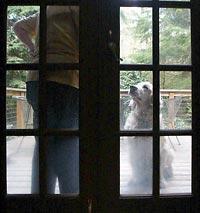What price a pet's life? $45,000 to treat Comet

Comet is like many golden retrievers: gentle, devoted, enthusiastically greeting each day with his wagging, plumed tail. He loves to swim, run in the woods and pack around his large toy hamburger.
But Comet is different. He's one of very few dogs worldwide to receive a stem-cell transplant for cancer treatment, rather than primarily for research. Cost of the therapy: $45,000.
The Bainbridge Island dog got the transplant last summer after developing lymphoma, a cancer of the lymph tissue. Now, after a long, steady recovery, he is showing signs of being cured.
The effort to save Comet involved dozens of dog lovers in five states and four countries, a renowned explorer in Honduras and a pioneering cancer center in Seattle.
His owners never flinched at the cost.
"It wasn't even a close decision," said Darrell Hallett, a Seattle attorney who with his wife, Nina, scrapped a kitchen remodel in favor of the retriever.
"How could I live with myself if I didn't do this and he had a good shot at getting through it?" Hallett said. "When you take on a dog, you have an ethical and moral obligation to take care of him."
Although Comet's is an extreme case, it shows how far some people will go for their beloved companions. Pet owners may pay thousands for treatments once reserved for humans, including kidney transplants, gall-stone removal, hip replacements, and chemotherapy, radiation and surgery for cancer, said Dr. Sandy Wright, a representative of the American College of Veterinary Internal Medicine.
Spending on veterinary care, including such high-tech procedures, has steadily increased — from $7 billion in 1991 to an estimated $19 billion in 2001, the American Veterinary Medical Association said.
Comet's transplant was performed by Bellingham veterinarian Dr. Edmund Sullivan. The stem cells came from a dog descended from the golden retriever of explorer Sue Hendrickson, internationally known for her 1990 discovery of the largest Tyrannosaurus rex skeleton ever found.
Hendrickson, a friend of the Halletts', owns Comet's mother and 11 other dogs at her home on a Honduran island. She spent months tracking down 40 of Comet's relatives to donate blood that was tested for a stem-cell match.
Scientists at the Fred Hutchinson Cancer Research Center in Seattle donated key advice and facilities for the procedure, which has rarely been done strictly as therapy for dogs. The Hutch has performed hundreds of experimental bone-marrow or stem-cell transplants on dogs over the past 40 years, as researchers perfected the techniques now used worldwide to treat cancer in an estimated 40,000 people each year.
"The early research that led to successful bone-marrow transplantation in humans was based on research conducted on dogs with cancer. For this we can thank man's best friend for contributing to a legacy that has saved ... thousands of people around the world," Dr. Rainer Storb, who participated in the research, said in a statement.
But Storb emphasized that the Hutch isn't in the business of treating animals. Its involvement in Comet's procedure was done as a favor, and the center can't help others, he said. Previous, unrelated research on the dog genome by another scientist resulted in the center receiving dozens of calls from dog owners wanting their pets' DNA analyzed.
A stem-cell transplant was performed successfully at the University of Massachusetts several years ago on a dog with lymphoma. And about 15 years ago, Dr. Robert Rosenthal, a Springfield, Va., vet, did bone-marrow transplants, which include stem cells, on 12 dogs. Three survived for at least three years.
Comet's kin rounded up
Comet first became ill in January 2004 and soon was diagnosed with lymphoma. The Halletts took him to Sullivan's clinic, Bellingham Veterinary & Critical Care, where vets treated their other golden retriever, Ajax, for pancreatic cancer two years ago.Sullivan's partner, Dr. Theresa Westfall, removed Comet's spleen and started him on chemotherapy. But within a few weeks he became very ill again. One night at the Halletts' weekend home on San Juan Island, they heard him creak through the dog door leading outside.
"I found him trying to dig into salal underbrush, going away to die," Nina Hallett said.
Lymphoma is a cancer affecting the immune system. It is the most common cancer in dogs, but the usual treatment, chemotherapy, can extend their lives for only about a year and a half.
Sullivan stopped the chemo on Comet when he became so sick. Meanwhile, Sullivan and Westfall searched medical literature on stem-cell transplants and discovered that almost all the research on dogs had been done at the Hutch. They asked Storb for his help in a transplant.
Hendrickson, a professional diver and fossil hunter, was the key to finding a relative of Comet's that could donate stem cells to replace his failing immune system. Her dog Skywalker, who travels the world with her, is Comet's mother, and Hendrickson knows the owners of all her 13 offspring.
"I knew where the dogs were because they are all Skywalker's puppies, grandpuppies or great-grandpuppies," Hendrickson said. "I gave, never sold, the dogs only to good friends."
All the dog owners were eager to help. But collecting the blood was sometimes an adventure in itself.
When Hendrickson's nurse friend couldn't draw blood from 12-year-old Skywalker's small veins, Hendrickson arranged to meet a vet she knew at a Honduran airport during a flight layover with her dog. But a protest over gas prices blocked roads to the airport, so the vet had to walk 12 miles to take the blood from Skywalker.
Hendrickson has five friends with Skywalker descendents in the Chicago suburb of Winnetka, Ill. Four of them showed up at the same time at the same veterinary clinic for blood draws. "We have a pod, a substrata of Comet's family," said Karen Van Dyke, one of the owners. "We get them together and have birthday parties."
Other blood came from dogs in Washington, California, Montana, Florida and France.
In the end, three dogs were perfect matches: Rexie, owned by Hendrickson's brother in Seattle, and Rico and Ron, formerly owned by a friend in Key West. Rico got the nod because he's bigger and could yield more stem cells. Hendrickson flew to Florida to get Rico and deliver him to the Hutch.
"I never in my life heard of one dog being sent off across the country to help another dog," laughed Rico's owner, Nelson "Papo" Garcia, who worked with Hendrickson on a diving expedition off Cuba. She brought another of his dogs — Rico's father, Robinson Crusoe — out of Cuba when Garcia defected several years ago.
New cells flourishing
The transplant itself was conducted last June at the Hutch. A special machine separated stem cells from Rico's drawn blood. Meanwhile, Comet was given total body radiation as part of the treatment to kill his diseased immune cells. The stem cells were then intravenously infused into Comet to grow new, healthy cells.Sullivan brought Comet back to his Bellingham clinic and placed him in isolation for 14 days to protect him from infections as his immune cells grew. The Halletts paid about $200 for a glass door on the isolation room, so Comet could see what was going on in the clinic.
About a month after the transplant, the stem cells began to reject their host body, causing scaly sores on Comet's muzzle. "He looked terrible," Sullivan said. "But he didn't care. He was very robust and tolerant of his condition."
An anti-rejection drug, cyclosporine, cleared the condition and he's had no other problems. The new cells have flourished and Sullivan is optimistic that all diseased cells are gone.
Reports of Comet's transplant have spread, and Sullivan is consulting with four other dog owners about doing transplants for lymphoma. He says he plans to offer the treatment as part of his regular services — for a fee of about $25,000. He bought a machine to separate stem cells, contracted for laboratory services and arranged for Washington State University to provide total body radiation.
Sullivan said a few other vets have questioned the use of such expensive technology in treating a dog. But he says it's up to the owners to decide how much is too much.
The Halletts said they are fortunate to have the money to afford such care. Spending it on Comet, they said, was infinitely better than using it for the kitchen remodel they had planned.
"We started this with the idea that whatever came, we wanted to help Comet and other dogs in the future," Nina Hallett said. "Once we started, we couldn't stop."
Warren King: 206-464-2247 or wking@seattletimes.com
